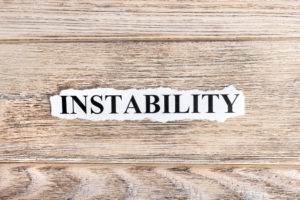
This spherical ball that we live on is not stable. It spins erratically, not in an upright rotation, but at a tilt. The ratio of water to land is grossly unbalanced, 70:30, and the evolution of the human brain is hugely out of kilter with other species. Is it any wonder, therefore, that we live in an incredibly unstable and erratic world?
Humans have a love of categorising things partly because it helps provide stability in an otherwise randomly volatile society. For example, when we talk about plants and animals we are essentially describing the boundaries that exist between the two groups. Similarly, with fruit and vegetables – (although tomatoes continue to defy reason – Ed). Religions are broken down into categories; so too politics. We do it all the time. We classify absolutely everything in an effort to make it easy to describe and to compare differences. However, when things get fuzzy then instability kicks in.
In our lexicon, if demand outstrips supply then prices rise and we get inflation – and when there is oversupply and less demand we get deflation. Currently that equation seems very unstable. Many people understand what free-market capitalism is supposed to look like but few can grasp what it actually means today. We have the unprecedented drive by several major countries to intervene directly in the free markets by taking ownership of – and manipulating the price of – government and corporate bonds. This is the type of activity that we had previously expected to see only in centrally-directed political administrations like communism or a dictatorship. The fact that it is happening and is being tolerated is hugely counterintuitive. This does not sit well with our yen for accurate categorisation.
When governments interfere with the free exchange of markets they do so in an extraordinarily convoluted and uneven way. Legislators willingly allow unelected representatives in their Central Banks to pull the strings and direct all proceedings. The Central Banks’ tactic of choice is to engage with large investment banks to hoover up all of the bonds that the Central Banks want to buy. Unwittingly or not, this is an inherently unstable course of action. It provides the investment banks with insider knowledge that would not be permitted in free, transparent markets. It allows the investment banks to encourage their high-net-worth clients to piggy-back on the purchasing frenzy. And it drives profitable rewards for bank executives and enhanced bonuses for bank traders. It promotes greed and amplifies inequalities.
This inevitably leads to instability and a cry from the masses to be similarly rewarded. Ironically, this defies classification because it offends everything we believe about our democracies, which we see as elected and equal. If we observe unelected and unequal behaviour then we will fight the instability. We will do everything we can to get back to our understanding of how democracies and free-market economies should behave. We will ask ourselves the rudimentary question; our world may be unstable but does society need to be so uneven?

